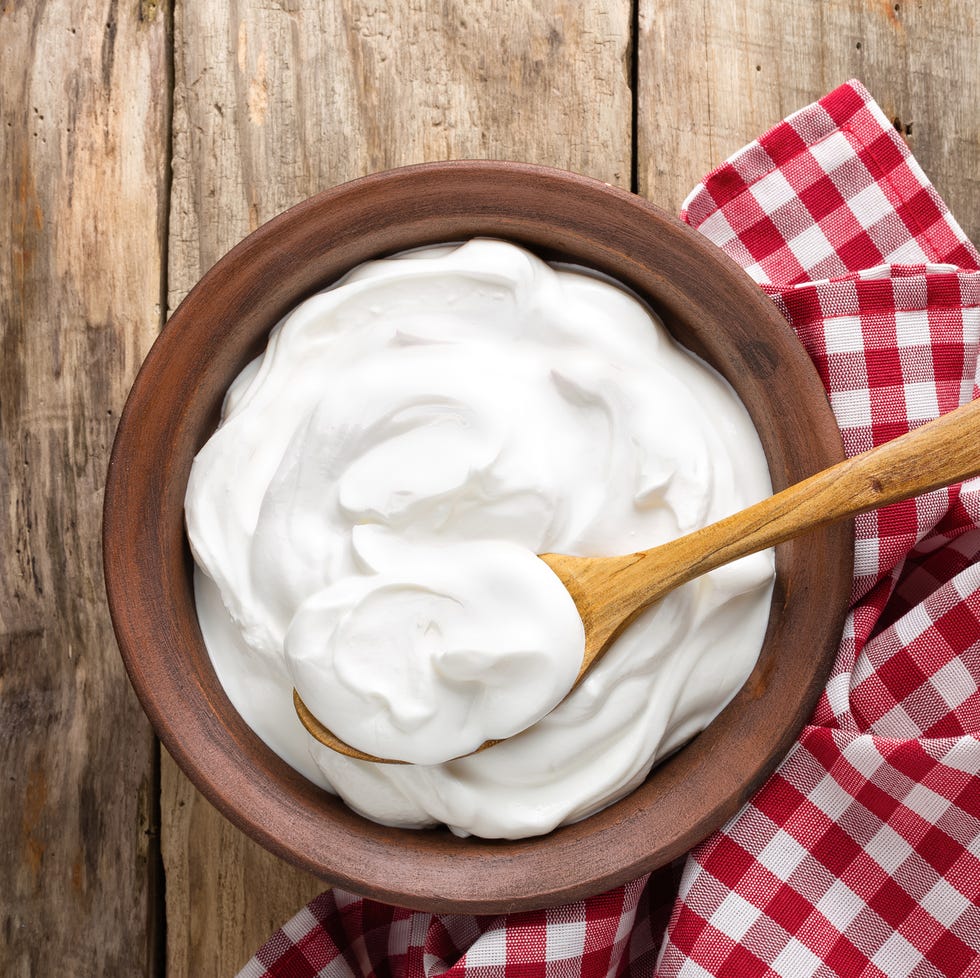Fermented foods

Fermented foods like yogurt, kimchi, kefir and sauerkraut contain probiotics that support gut health, which is closely linked to mental health through the gut-brain axis, says Vasquez. Research on probiotics and gut health is still emerging, but a recent review mentioned positive effects on mood in its summary of the health benefits.
Incorporate fermented foods such as kimchi, kefir, or plain yogurt into your diet to support gut health and potentially boost mood.
Fatty fish

Omega-3 fatty acids, specifically EPA and DHA, have been shown to support brain health and reduce inflammation, which has been linked to mood disorders. “Studies indicate that omega-3 fatty acid intake, particularly from fatty fish, is associated with a reduced risk of depression. This effect is especially prominent in women,” says Vasquez. Recent research has also found that omega-3 fatty acids may influence depression by affecting brain activities that are involved in mood regulation.
Because omega-3s must be obtained from foods you eat, add salmon, mackerel, herring, albacore tuna, sardines and trout to your diet a few times a week.
RELATED: A New Study Says Taking This Supplement Every Day Could Slow Down Aging
Advertisement – Continue Reading Below
Whole Grains

Fiber is the key here. “Dietary fiber is key to maintaining gut health, and emerging evidence links gut health with mental health. Fiber may help balance blood sugar and improve mood stability,” says Vasquez. “The gut microbiome plays a role in inflammation, and a low-fiber diet can reduce the variety of beneficial bacteria, contributing to higher chances of feeling depressed.” Plus, research suggests that higher fiber intake is associated with better mental health quality of life over time, potentially due to its effects on gut microbiota and inflammation.
Turn to whole grains, such as brown rice, oats and quinoa, to boost fiber intake for better mood support.
RELATED: 11 Healthiest Whole Grains to Add to Your Grocery List
Nuts and seeds

“Nuts and seeds are rich in healthy fats, magnesium and vitamin E, which support brain health,” says Vasquez. “Magnesium, found in nuts, is particularly beneficial for its role in mood regulation.” The Mediterranean diet, which is rich in nuts and seeds, has been associated with a reduced risk of depression.
Snack on a handful of nuts or seeds, such as almonds, walnuts and pumpkin seeds, a few times a week for a boost in mood-enhancing nutrients.
Advertisement – Continue Reading Below
Berries

Berries are high in vitamins, minerals and antioxidants such as carotenoids, flavonoids and anthocyanins, which may help reduce inflammation that has been associated with mood disorders, says Dr. Kesavarapu. Research has shown that a higher anthocyanin intake from fruits like blueberries, strawberries and blackberries has been linked to lower depressive symptoms. A recent review also found that the phytochemicals in berries may protect against age-related neurodegenerative diseases by reducing inflammation and improving the brain’s neuroplasticity.
Aim for 2 to 3 servings of fruit, including berries, per day. Toss them over your morning oatmeal, blend into a smoothie or enjoy them as an afternoon snack.
Dark chocolate

Of course, the idea of chocolate is appealing for a quick mood boost, but there’s actually a large body of research on chocolate’s effects on mood and the ability to increase feelings of calmness and contentedness. “Chocolate contains cocoa polyphenols that have antioxidant properties, which increase neurotransmitters like serotonin or dopamine,” says Dr. Kesavarapu.
Have a small piece of dark chocolate (70% or higher) when you’re craving something sweet.
Advertisement – Continue Reading Below
Coffee

“Coffee contains caffeine and non-caffeine compounds that may support mood regulation by affecting brain chemicals,” says Vasquez. “While caffeine is known for its alertness-boosting effects, compounds such as chlorogenic acids in coffee may directly affect neurotransmitters like serotonin and dopamine, improving mood.” In fact, a recent meta-analysis found coffee and dietary caffeine may have a protective effect against depression.
A moderate intake of coffee (1 to 2 cups per day) may help lift your mood, but be mindful of consuming it late in the day because it could hinder your sleep.
Mushrooms

You may not think mushrooms are nutritional powerhouses, but they’re packed with nutrients such as B12 and antioxidants that support brain function, says Vasquez. What’s more, research has found that mushrooms contain numerous bioactive compounds that may help reduce anxiety.
Add mushrooms such as shiitake, maitake, and reishi to salads, stir-fries and soups for their rich nutrient profile and mood-boosting potential.
Advertisement – Continue Reading Below
Green tea

Watch Next

Advertisement – Continue Reading Below
Advertisement – Continue Reading Below
Advertisement – Continue Reading Below
